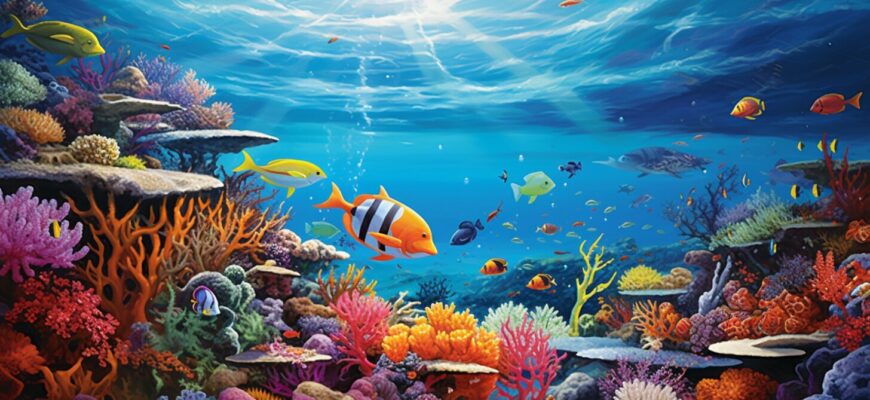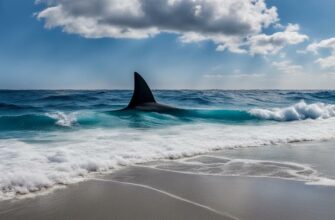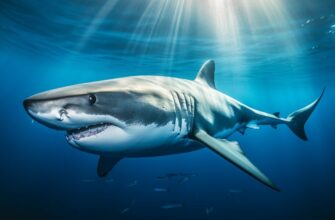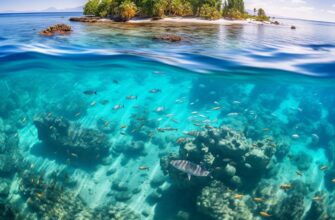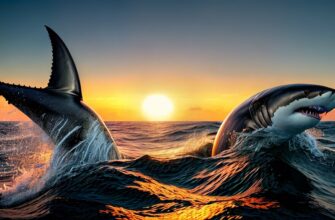Sharks are mysterious creatures that fascinate and frighten us at the same time. While they play a crucial role in maintaining the delicate balance of marine ecosystems, their presence also instills fear in many beachgoers and divers. This curiosity surrounding sharks has led to the question of whether there is an ocean without sharks.
In this section, we will discuss the possibility of shark-free oceans and explore the importance of sharks in the ecosystem. We will also delve into areas known for lower shark populations or even no sharks at all, as well as highlight the incredible diversity of marine life that thrives without a significant shark presence. Keep reading to learn more about the world of shark-free oceans.
- The Role of Sharks in the Ocean
- The Role of Sharks as Top Predators
- Sharks’ Effect on Other Marine Animals
- Areas with Few or No Sharks
- Known Areas with Fewer Sharks
- Areas with No Sharks
- The Importance of Studying Shark-Free Areas
- Marine Life Thriving Without Sharks
- FAQ – Frequently Asked Questions
- Why are sharks important?
- Is it possible for there to be an ocean without sharks?
- What are some areas with lower shark populations?
- Do any marine species thrive without sharks?
- Why is it important to protect sharks?
- How can I contribute to shark conservation?
The Role of Sharks in the Ocean
Sharks play a crucial role in maintaining the balance of marine ecosystems. As top predators, they help regulate the populations of prey species, preventing overgrazing that can have a ripple effect throughout the food chain.
Sharks also influence the behavior of other marine animals. The mere presence of a shark can cause prey species to alter their habits, such as avoiding certain areas or swimming in large groups for protection.
In addition, sharks contribute to the health and diversity of marine ecosystems. Their feeding patterns can create spaces for other species to thrive, and their waste products provide essential nutrients for other organisms.
The Role of Sharks as Top Predators
Sharks’ position as top predators means that they have a significant impact on the ecosystem. By keeping populations of prey species in check, they help prevent overgrazing and overpopulation that could lead to habitat destruction and other ecological problems.
They also help to maintain biodiversity by creating spaces for other species to thrive. When sharks feed, they often leave behind scraps of food that can create microhabitats for smaller organisms like scavengers and filter feeders.
Furthermore, sharks help to regulate the levels of other predators in the ecosystem. For example, if there are too many smaller predators, they can quickly consume all of the prey species, leading to a collapse of the food chain. However, with the presence of sharks, these smaller predators are kept in check and the ecosystem remains in balance.
Sharks’ Effect on Other Marine Animals
Sharks also influence the behavior of other marine animals. For example, when sharks are present in an area, prey species may avoid that location or swim in larger groups for protection. This behavior helps them avoid shark attacks and can also protect them from other predators.
Furthermore, the fear of sharks can also have an impact on the behavior of other marine animals. Studies have shown that when sharks are present, other animals may swim closer to the surface or avoid certain areas, which can alter their feeding habits and potentially disrupt the balance of the ecosystem.
Overall, sharks play a vital role in maintaining the health and diversity of marine ecosystems. Without them, the entire food chain could be thrown off balance, leading to irreversible ecological damage.
Areas with Few or No Sharks
While sharks are an essential part of marine ecosystems, there are areas where their populations are lower, and some regions where they are entirely absent.
The reasons behind these areas with few or no sharks are varied and complex. Some factors include changes in the ocean’s temperature, the impact of commercial fishing, and natural phenomena, such as ocean currents and upwellings.
Known Areas with Fewer Sharks
One well-documented example of an area with lower shark populations is the Pacific Island of Palau. While the waters surrounding Palau are home to over 130 species of sharks, researchers have noted a decline in their populations in recent years. The reason behind this is unclear, but overfishing and habitat loss may be contributing factors.
Another example is the Mediterranean Sea, where shark populations have been reduced by excessive fishing. The sawfish, for instance, has become extinct in this region, and other species, such as the shortfin mako, hammerhead, and thresher sharks, are now considered endangered.
Areas with No Sharks
There are also regions where sharks are entirely absent, such as the freshwater habitats of lakes and rivers where they cannot survive.
But in the ocean, while rare, shark-free areas do exist. One example is the volcanic island of Easter Island in the Pacific Ocean. Researchers have found that due to a combination of factors, including the island’s isolation and unique ocean currents, there are very few sharks present in the waters surrounding the island.
The Importance of Studying Shark-Free Areas
By exploring areas with few or no sharks, researchers can gain a better understanding of the role these creatures play in maintaining healthy marine ecosystems. Such studies can highlight the impact of human activities on shark populations, and the consequences of their disappearance on the wider marine ecosystem.
Furthermore, by investigating the productivity and biodiversity of areas without significant shark presence, researchers can gain insights into how other marine species have adapted to fill the ecological niches that sharks would otherwise occupy.
While sharks are vital to the ocean’s ecosystem, studying areas without them can help us better appreciate their importance and encourage conservation efforts to protect them.
Marine Life Thriving Without Sharks
While sharks play an important role in maintaining a balanced ecosystem, it may come as a surprise that there are many species that thrive in the absence of these top predators. These species have adapted to life without sharks, and their unique characteristics have allowed them to survive and even flourish in areas with lower shark populations.
One such example is the coral reefs found in the Pacific Ocean. Without the presence of sharks, smaller fish and other marine life have been able to thrive in these areas. The delicate ecosystems of these reefs are highly diverse, and the absence of sharks has allowed the populations of other fish and invertebrates to grow and flourish.
In addition to coral reefs, there are also many deep-sea environments where marine life has adapted to life without sharks. For example, the giant tube worm, which can grow up to several feet long, has a symbiotic relationship with bacteria that allow it to live in the harsh conditions of hydrothermal vents deep below the ocean’s surface.
Other unique species that thrive without sharks include the mantis shrimp, which has the ability to punch with the force of a bullet and see colors beyond our own visible spectrum, and the nautilus, a prehistoric-looking cephalopod that has remained virtually unchanged for millions of years.
The incredible biodiversity that exists in areas without significant shark populations highlights the importance of preserving and protecting these environments. It’s a reminder that the ocean is a complex and interconnected web of life, and every species plays an important role in maintaining its delicate balance.
FAQ – Frequently Asked Questions
Here are some commonly asked questions about sharks and shark-free oceans:
Why are sharks important?
Sharks play a crucial role in maintaining the balance of ecosystems as top predators. They regulate the populations of other marine species and prevent overgrazing of plant life. Additionally, they promote biodiversity and help to keep the ocean healthy.
Is it possible for there to be an ocean without sharks?
While there may be areas with lower shark populations, it is highly unlikely for there to be an ocean without sharks. As apex predators, they are vital to the marine food chain and ecosystem balance.
What are some areas with lower shark populations?
Areas with lower shark populations include the Mediterranean Sea, the Gulf of Maine, and the waters surrounding the Caribbean island of Bonaire. However, it is important to note that even in these areas, sharks still play an important role in maintaining the balance of the ecosystem.
Do any marine species thrive without sharks?
Yes, there are some marine species that have adapted to survive and thrive without a significant shark presence. For example, some coral reefs have evolved to be less attractive to sharks, allowing other marine species to flourish without the threat of being eaten.
Why is it important to protect sharks?
Sharks are facing many threats, including overfishing, habitat loss, and pollution. Without them, the delicate balance of marine ecosystems could be disrupted, leading to a cascade of negative effects. Additionally, sharks have many important ecological and economic benefits, such as contributing to ecotourism and providing valuable resources for medical research.
How can I contribute to shark conservation?
There are many ways to help protect sharks, such as supporting organizations that focus on shark conservation and spreading awareness about the importance of shark conservation. Additionally, choosing seafood that is sustainably sourced and avoiding products made from shark parts can help reduce the demand for shark products.

